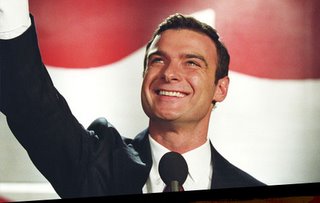A Manchurian Candidate for the 21st Century

A Movie Review
After his awful reimagining of Charade, I admit to being hesitant of director Jonathan Demme's lose re-make of John Frankenhimers classic political thriller The Manchurian Candidate. However, after having now viewed the film I am both surprised and delighted to say that it is almost as good as the original.
Based on Richard Condons novel about a solder in the Korean War brainwashed to be a communist assassin, the 1962 film version of The Manchurian Candidate was a film ahead of its time both in complexity of narrative and technique. Withheld from public view for many years on account of certain plot simularites to the 1963 Kennedy assassination, Frankenheimers Manchurian Candidate is currently a reverenced film among people in the cinematic know, making a remake a daunting task. Demme I think made the right decision in his production not only in updating the stories setting but also in changing the plotline in several major ways, making it more of an homage then a remake.
Like the original movie this one concerns a group of solders who are ambushed and kidnapped in war time (in this case the 1991 Gulf War), and brainwashed by members of a vast conspiracy. Denzel Washington takes the Frank Sinatra role (Franks daughter Tina was a producer on the film) as Major Ben Marco the company commander. Liev Schreiber does a worthy job as the melancholy loner Sgt. Raymond Shaw, the original moody characterization of which became actor Laurence Harveys signature performance. Instead of international communists being responsible for the group abduction like in the first film, this time the conspiracy is the work of an international conglomerate called Manchurian Global, a corporation that is suggestive of the former employer of our current vice-president.
Fourteen years after their mysterious three-day disappearance in the sands of Kuwait, Major Marco starts having a series of nightmares triggered by renewed contact with a fellow abducte. Marco begins to remember what really happened to him in the desert, and sets about trying to convince Raymond Shaw that they were the victim's of mind altering experiments. Shaw, although unsure at first comes to suspect that Major Marco might be on to something, however as New York Congressman and newly minted vice-presidential candidate for the Democratic Ticket (alongside that "sound-bite from Nebraska", Gov. Bob Arthur), political considerations prevent his swiftly acting on his gut. By political considerations I am of course referring to the power-hungry machinations of Raymond mother 'Hillary-esq' Virginia Senator Eleanor Prentice Shaw (Meryl Streep), who having already strong-armed liberal Connecticut Senator Thomas Jordan (Jon Voight, whose character is the father of Raymonds pined for first love) out of the V.P. slot, is not about to let anything ruin her plans for her son.
The movie tries very hard to be a relevant commentary on the current political situation, but in an attempt to amp-up the cold-war paranoia feel of the original film makes things seem perhaps more dark then they really are. The world this picture presents us with is going through a heightened version of the War on Terror, which in this case began with a presumably Sept. 11th type event refereed to as 'Bloody Friday' and culminated with U.S. military action in Indonesia and Africa. With U.S. troops positioned nearly everywhere in urban areas and cites like Chicago subject to suicide bombers, the America of Demme's Manchurian Candidate is not so much the nation we know, but the nation we feared we'd live in during the months immediately after the terrorist attacks of 2001. Also notable in this film is the performance of Kimberly Elise (who by-the-way played Denzil Washintons wife in Nick Cassavetes film John Q.) as Marco's love interest Rosie, a character more important to the plot then her Janet Leigh counter-part in the original. This Manchurian Candidate is a solid and engaging film that despite its flaws is still relevant to the current American zeitgeist

0 Comments:
Post a Comment
<< Home